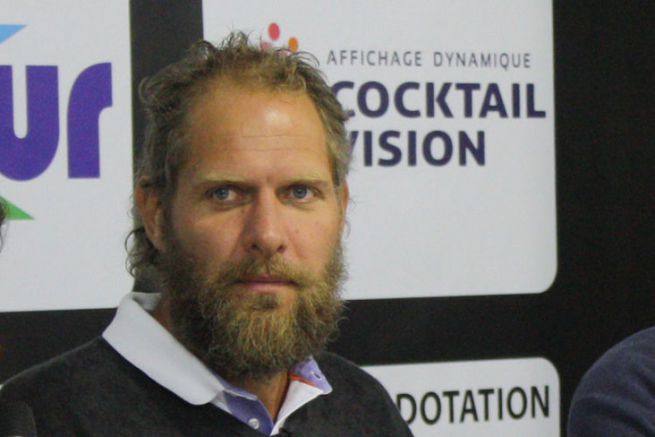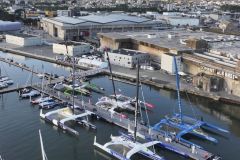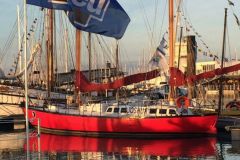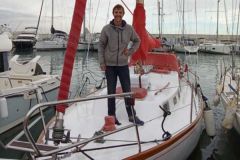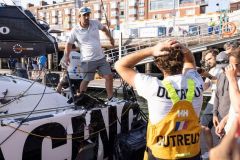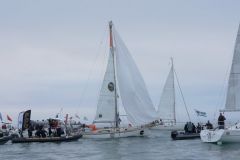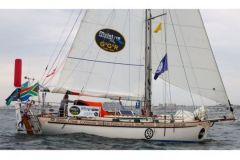Did you get any good moments?? Do you have a good memory of this adventure?
There were many good times. Before reaching Cape Horn, I had big waves in the direction of the wind... everything was perfect. I crossed a fishing boat, it has dit?:? "What are you doing ici?? You're a little bateau?!" He passed very close, he told me that on the AIS he could see me at 16 knots!
What will you learn from this experience at 7 mois??
I think the most terrifying thing and what will mark me is my mood swings. There is a very high and a very low. I think Jean-Luc was a little luckier in southern Africa. I spent 18 days with the wind up my nose. It was very difficult to bear, but when the wind changes you are the happiest man
Were you bringing back in light airs? [NDLR Mark holds the record for crossing the Atlantic by rowing and had oars on board]
I didn't row as much as I had already rowed. For the deckchair, I rowed 18 hours a day. But in southern New Zealand, I rowed 12 hours a day for 2 days. I rowed for 2 hours and then rested for 2 hours. That's why I still have a lot of diesel fuel.
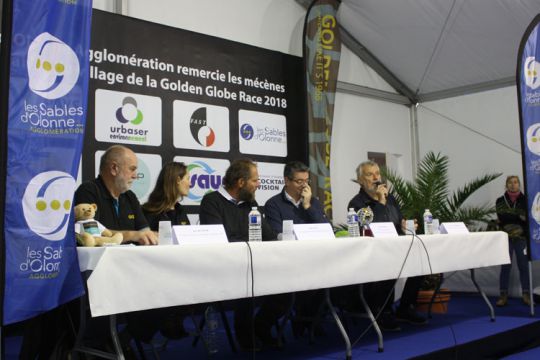
How did you feel about your lack of water at the end of course??
I ran out of water from January 1. I made water by hand with the small emergency watermaker required on board for 25 days. I had 10 litres left for the last 5 days, I thought it would be enough, but it was a little bit limited. I haven't had anything to drink in the last 24 hours.
I was pumping 4 to 5 hours a day. I counted that it would take 1562 pumps to get 0.7 litres. At first I couldn't pump more than 30 minutes a day, but with experience I ended up holding out for two hours in a row. Except that when I went up north, to get that 0.7 liter of fresh water, I sweated 0.5 liter of sweat
After 7 months at sea, your hull is very clean while others have barnacle problems. How did you manage to keep her in this état??
I was very attentive to the condition of my hull. I've dived seven times. But I was still surprised by the proliferation of barnacles. During my previous round the world trip, I didn't have that much
On the descent of the Atlantic after about thirty days the boat was already covered with it
On my last dive, I came face to face with a shark. It had never happened to me on my previous crossings before. It seemed huge to me. He must have been at least 10 feet tall and he passed very close to me. Other competitors also encountered sharks, which slowed down the cleaning of the boats a lot
Have you met any whales?
Yes, I met some in the northern Azores. I was busy with my music when I saw something in the water. I've changed course. It was a whale. I also saw a lot of them when I was heading towards A Coruña a few days before the finish. There was a 50-knot wind and whales were following the boat's wake.
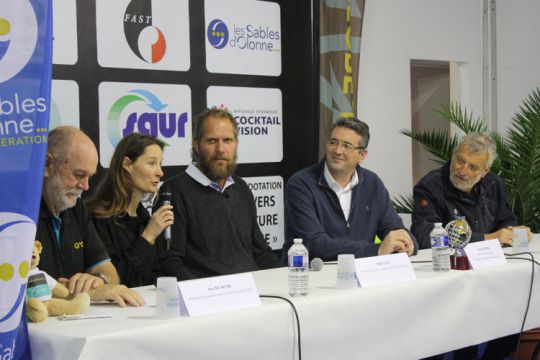
You had the same boat as Jean-Luc, but Jean-Luc had a 1.50m shorter mast. What do you think has changed?
I'm not really an expert in navigation. It is obvious that a shorter mast has some advantages in the South Seas, but it is disabled in the Atlantic. If I had to do it all over again, I'd leave with the same mast
You fished a lot during this world tour, can you give fishing lessons to Jean-Luc for his next croisières??
I was pretty lucky when it came to fishing. In particular, I caught two big fish that took me a long time to get back on board. It varied my diet a little bit.
I still have plenty of food in the boat, maybe for another 100 days. But it's always the same dishes and I'm tired of it. I took 5 different dishes and 50 of each. But fishing is very simple, you just throw it in the back and that's it!
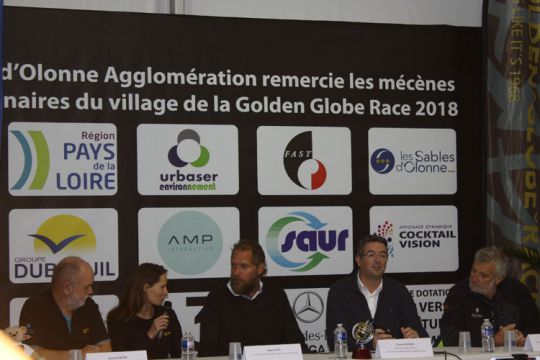
The South Seas have been particularly lenient with you. Can you describe this traversée??
I really loved the Pacific, it was a lot of fun. The Indian Ocean and the Atlantic were much more difficult, I had a lot of headwinds
In the Pacific there were 40-45 knots of wind, 7-metre troughs, long waves. But I was warned. It's always like that. I understand why sailors want to stay and return and are not in such a hurry to sail up the Atlantic
When Susie quit the race, you called right away to talk to her. How did this link between competitors come about tissé??
Yes it is very surprising on this race the complicity we have established between the competitors. Not only with Susie, but also with Gregor and Abhilash. At times we would call each other four times a day. I was on the lookout and waiting for these communications. We supported each other in difficult times. We contacted each other to compare our positions to see if we had lost or gained distance from others. We lived this race together. The day before yesterday I managed to talk to Uku. Yesterday I didn't have a signal. Since I arrived last night, I've had a call from Abhilash.
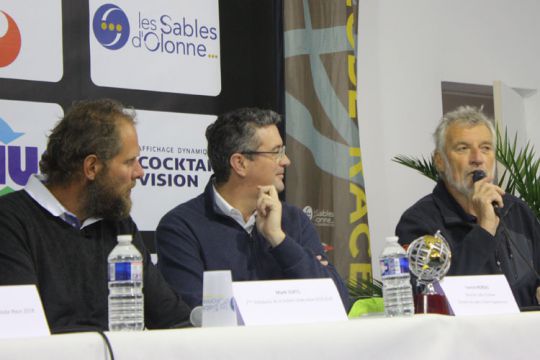
In the Azores, for the time of a ranking you were ahead of Jean-Luc. At that moment did you think you could arrive in Les Sables-d'Olonne before lui??
Of course. I would have liked to arrive a little earlier, but it made the race exceptional to see that I was winning a little bit every day on Jean-Luc. It really motivated me. If I had been a little closer to the Cape of Good Hope, I might have had the chance to race against him.
Jean-Luc encouraged me and asked me to hurry so that it would be more interesting and we could race together. It was a real pleasure. He made the race very exciting. It was really something special for me to have Jean-Luc in front of me. It was an additional challenge, a real motivation. We communicated daily on the radio to discuss our approach to the race
Considering the bad weather of the last few days, how did you make an astronomical point?
I saw the sun the day before yesterday, but I had stayed 2 days without being able to do a position calculation. But there are a lot of boats around me - except they shouldn't know how to use a VHF because no one answers. I estimate that less than 50% of the boats respond. Since we have an AIS transmitter, but no receiver, I guess they think we see them and they don't imagine we can navigate any differently from what they know.
But when you are in contact with a boat, the race rules give you the right to ask for your position - this was also done 50 years ago, the boats exchanged their estimate of their position and adjusted themselves according to the information received.
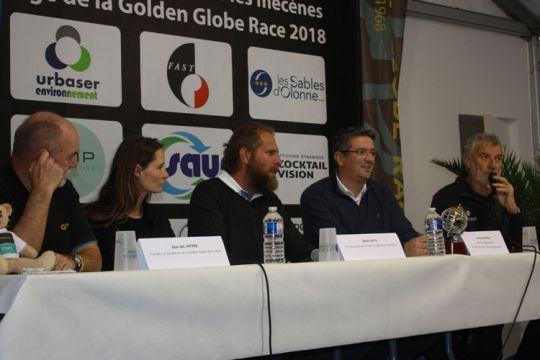
During the storm in the Indian Ocean during which Gregor and Abhilash capsized, you called the race director twice. The first time to say that you were doing everything you could to survive and the second time to tell us that you thought you were going to die. Between these two calls, did you have 30 seconds to realize what is passait??
30 seconds a minute, I'd say! But to be perfectly honest, when you accept the situation, everything comes together naturally. At the very beginning, we had 60 knots of wind very quickly. I only had the storm, a wave went over the back of the boat and broke the down door. The boat went to the luff, went to bed and the water came in. There was water above the chart table, where all the instruments are. I pumped with both electric pumps and the hand pump until the boat was empty.
During this time the tip of the windvane gear was broken and the boat was yawing. As soon as it was emptied, I tried to get back to the helm by helping myself with some tips on the winch. The Rustler 36 is very difficult to steer. It's not pleasant at all. While I was at the helm, the boat took a very large heel, about 120°. I fell overboard and held on to the lines. When the boat straightened up, I was catapulted inside and fell to the bottom of the cockpit. I hurt my back very bad. It was probably the moment when I was most afraid
I fixed the windvane gear and never steered again. The windvane gear does it much better than I do. I would go out every 10 minutes to make sure everything was fine and go back inside.
I tried to drag ropes and chains because I had heard that some people do that. But with the ropes, the boat didn't react as I wanted. So I put everything back together and untied the very beautiful knots I had made, it took me an hour. It was all my emergency and spare equipment, I couldn't cut it off and leave it. The boat was doing much better when all this was brought up
What advice would you give to all those inspired by this course??
Pass your amateur radio licence before you even buy your boat. Because then you'll never have time. Another very important thing: a lot of sailing on the boat. It has been difficult for most competitors to have enough training and experience on their boats. Perhaps even at the level of the regulation it would be necessary to have more experience. Why not impose a transatlantic race as a prologue to this race?
It would really be better for each skipper to realize that he or she is capable of doing so. It's a big financial and human commitment and it's a shame to give up because they only became aware of it during the race. Finally, make sure you have the budget before you start the race.
